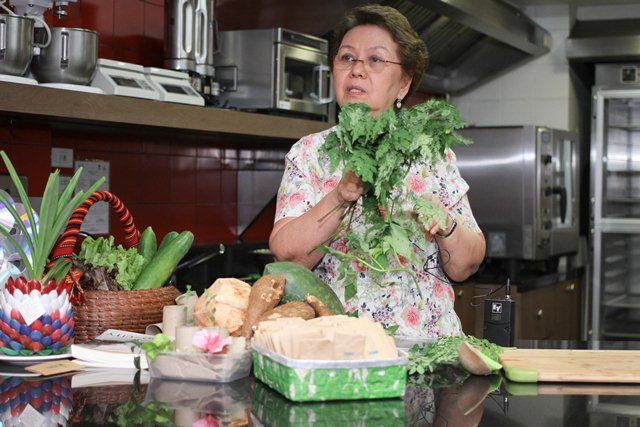The unprecedented aftermath of Super Typhoon Yolanda in the Visayas, in particular its effect on the region’s viable food sources, brings into clarity the unabated case of environmental degradation. Due to the severe detrimental repercussions that these issues may bring, many are left to ask: “How can one fully address or prepare for, much so survive, from such impending disaster?”
With these alarming post-calamity scenarios, environment champion and Cravings founder Annie P. Guerrero, takes the lead in making the difference. She came up with a comprehensive research framework on valuable disaster preparedness insights, including practical survival tips and the need to shift back to “green” sustainable living which she shared recently at the USDA Kitchen Demo Theater at Cravings Katipunan in Quezon City.
Going back to basics
In her “Cooking In Times of Disaster” demo-talk, Ma’am Annie shared tips on how to cook one’s food when a disaster happens. Her top list of survival foods are mostly endemically grown fruits and root crops such as banana, coconut, malunggay, cassava, papaya and camote.
“I grew up during the early years of the Japanese Occupation era. We often resort to cooking whatever is available, make the most of everything. We have to be resourceful and inventive,” she stressed.
Her Puto Maya recipe, for example, only needed two ingredients: malagkit or glutinuous rice and gata. According to her, Puto Maya counts as one of many other “war-time” food preparations. She also shared her Malunggay Ade recipe, which called for only two cups or two handfuls of sorted/washed malunggay leaves, four cups of water and a piece of panocha or moscovado sugar as sweetener. “Just simmer, strain and cool the juice before serving with syrup, and you’re done,” she said.
Besides her easy-to-follow recipes, she also cited other natural food necessities that would keep a person or even a family still properly nourished and satisfied, even without grocery supplies. She said people can survive with the help of Nature’s own bounty, and that a lifestyle of consuming organic foods nurtures not only your body, but also the Earth.
“The Yolanda onslaught reminds us of that. We need to nurture Nature for it to nurture us as well,” she said.
As for the Visayas tragedy, Ms. Annie said going back to basics is one way of fast-tracking its recovery. “We have the capacity to rebuild by just planting sustainable food. Our affected countrymen in the Visayas can begin rebuilding by planting malunggay and camote. The region has vast hectares of lands suitable for farming,” she said.

“Whether one is preparing for an impending man-made crisis or not, it’s critical to remember what exactly one needs to weather a disaster. Through the bounty of the land alone, man can survive. With no electricity or fuel, man can still eat provided that the land he stands on is nurtured and protected,” she noted.
Green matters: Addressing food and waste woes with ‘ecopreneurship’
As the author of two groundbreaking “green” books, An A-Z Guide for a Green Pinoy and An A-Z Guide for a Green Chef, Ms. Annie’s green advocacy is also emboldened in the practices of all companies under the Cravings Group, as it has been recognized recently with an ISO 14001, the first in the Philippines to receive such distinction after an audit by TUV Rheinland for the successful implementation of an Environmental Management System.
She also counts as among her most important pro eco-sustainability initiatives the “Zero-Waste Management” campaign which simply puts fundamental ethical values into action. “It all begins with proper segregation. The country wouldn’t be facing such garbage management problem had the law on and practice of segregation been seriously followed at the crucial local or barangay levels,” she stressed.
The Cravings Group, through its social arm Culinary Education Foundation, has been pursuing eco-sustainability goals by practicing composting, vermiculture, and aquaculture. Apart from enterprising recyclable materials like plastic spoons and soda can tabs, CEF also produces “Bokashi” (fermented organic fertilizer) which hastens the decomposition of kitchen and garden wastes.
Ms. Annie also said organic gardening can be done successfully even on cramped backyard spaces by using discarded plastic containers. The Edible Garden, she added, hopes to highlight and encourage self-reliance and sustainability — with the end of addressing poverty and lessen dependence on relief work for survival.
The event also marked the official launch of “Cravings Goes Organic” weekend organic market last Nov. 16. Cravings Katipunan will be dedicating all Saturdays and Sundays exclusively for shoppers to avail the freshest and organically-grown farm produce and poultry staples. Organic eggs, kale, cauliflower, red cabbage, and Sagada oranges are among the best buys.